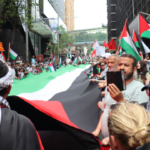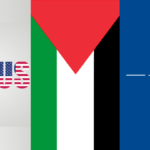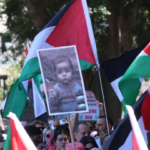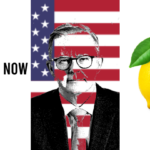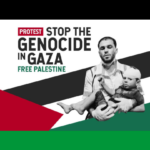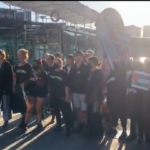“Ongoing Nakba. Ongoing Ethnic Cleansing”: APAN’s Noura Mansour on Gazan Atrocities
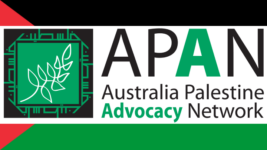
The wholesale massacre of 2.3 million Palestinians held captive within the borders of the 40-odd kilometre strip of land that is Gaza has continued for over 40 days now. And there are no signs of Israel slowing down its all-out assault on one of the most populated regions on Earth.
Despite an attempt to block out the truth of matters on the ground, commentators have been calling this out as a colonial crime on a scale never seen before, and it’s the first time a genocide has been broadcast 24/7 across the globe, with over 12,000 now dead, including 5,000 children.
The pretext, the code being used to justify the wanton killing of Gaza’s population, is that Hamas has embedded itself so intricately throughout civilian society in order to shield itself behind it that the killing of all Palestinians is warranted and facilities like hospitals are being targeted.
The population of Gaza, a majority of whom are refugees, have been living under a strict, close-to-starvation-level blockade for the last 16 years. And it is this group of people that the Israeli government has decided to unleash the full force of its technologically advanced war machine upon.
In full view
The western allies have been lining up behind the United States in their blind support for the Israeli government, despite the fact that this “war” involves a highly equipped Tel Aviv carpet bombing an under-resourced civilian population held captive within a bordered region.
Israel called for Palestinians to leave northern Gaza and head south to safety. Yet, despite this, Israel has continued to randomly bomb the so-called safe zone. And now that most have fled to southern Khan Younis, Tel Aviv is demanding it be vacated, but there is nowhere left to flee.
The intensity of the bombing campaign has levelled northern Gaza, making it a landscape that will long be uninhabitable. An Israeli document leaked earlier this month shows that the nation’s government had been discussing a plan to push the Palestinians out of Gaza and into Egypt.
Energy security advisor to US president Joe Biden, Amos Hochstein was in Israel on Monday to discuss how to contain the conflict so that it doesn’t spread to Lebanon, as well as plans to economically revive the Gaza Strip via the development of offshore natural gas fields.
Global implications
In Australia, both federal and state governments have lined up to support the Israel’s settler colonial expansion into the Gaza region, which has also escalated in the West Bank over recent months, with the equation here being one colonial power supports the other in the oppression of the occupied.
But a deep disconnect has been exposed. The streets have been overflowing with Palestinian support. At Port Botany on Tuesday evening, hundreds of protesters gathered to block a ZIM container ship as that company is openly supporting Israeli expansionism.
NSW police deployed 80 officers to the area, and as the evening dragged on, law enforcement began using excessive force to aggressively pick off demonstrators one-by-one, arresting them, taking them into the station and charging them with the new draconian antiprotest laws that stand in NSW.
Sydney Criminal Lawyers spoke to Australia Palestine Advocacy Network (APAN) advocacy lead Noura Mansour about how the alternative and social media have undermined the official narrative on Israel, so that the lies of the line the mainstream media is presenting have been exposed.
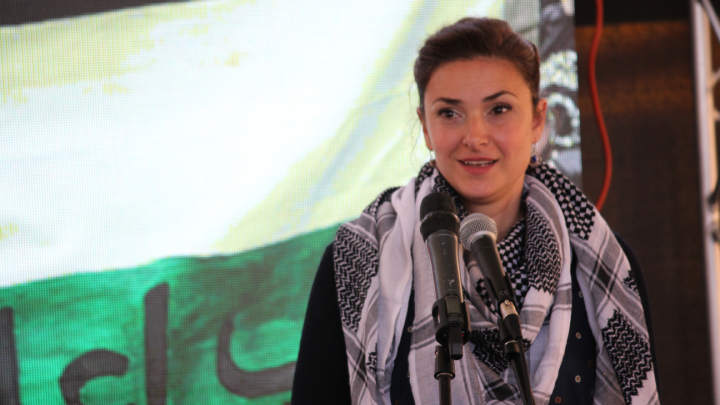
Noura, as a Palestinian political analyst who has long been advocating for freedom for your people, how should we consider what’s taking place in Gaza?
It’s important when we talk about what is going on to put it in context, so as to apply the right framework.
When we Palestinians speak about the Nakba, we say it is ongoing. It is not something that happened in 1947 and then it ended there.
We talk about the Nakba and the process of expansionism of the Zionist Israeli settler colonial project as something that is ongoing.
So, what is happening today is part of that ongoing Nakba. It is ongoing ethnic cleansing. It is ongoing genocidal policies and what is currently being displayed by the Israeli state.
In Gaza, it is just further reinforcement and validation of our argument as Palestinians, which is that Israel means to basically eradicate the Palestinian people.
The Zionist settler colonial project is no different from any other settler colonial projects around the world, in the sense that it’s eliminatory by nature, and the elimination process takes different forms and shapes.
One of which is the ongoing genocide in Gaza.
So, what is happening now is something that, as far as Israel is concerned, would have happened in some sort of form at some point in the future?
It didn’t have to happen. It is something the international community could have prevented. It is something that political leaders could have prevented if people called for accountability decades ago and if international law was applied in the context of Palestine.
We saw how the international community – and when I say that I mean at the official level – responded to the war in Ukraine. And if this response was applied in the Palestinian context, then we wouldn’t be where we are today.
What would you say it means for Israel to be carrying out these atrocities while the globe is watching? Is the exposure the situation in Palestine is receiving changing global perception regarding the Israeli state?
Currently, with social media and the advent of citizen journalism, it has been more difficult for Israel to maintain its propaganda or hasbara. The hasbara machine is currently struggling to maintain their claim.
That claim has been challenged by facts on the ground that have been confirmed by people in Gaza and other parts of Palestine.
So, the perception of what is happening globally is there is no pivotal change, as when we talk about the global support for Palestine that is something that has always been present, even in the 1980s and before that.
But currently because people have more access to information and firsthand experience in terms of what is happening in Gaza, that support has extended exponentially.
We can see that it is impossible to keep suppressing these Palestinian truths and facts that are currently being conveyed by people on the ground.
So, a lot of what is happening now is the alternative and social media are providing information that would have been suppressed by the major mainstream outlets?
That is correct. That is not to say that social media platforms do not practise that sort of censorship and do not suppress Palestinian content.
We’ve seen and have had reports from different Palestinian organisations that are focused on digital rights, such as 7amleh, as well.
Basically, they document all the instances in which the Palestinian content is being suppressed on all of these social media platforms.
Definitely since social media began to challenge mainstream media, we have had more Palestinian content than before.
The US-led western allies have repeatedly stated that Israel has a right to defend itself? As the globe watches these leaders unite in their support of Israel as it carries out genocide, what effect would you say this is going to have on the international rules-based order?
When we talk about the global impact, it is important to highlight that settler colonial states rally in support of each other.
So, what we are seeing at the moment with the United States, Australia and the UK and other parts of Europe, they’re practising solidarity amongst settler colonial states.
But going back to the question, it is also important to highlight that the western allies are heavily invested in Israel as a project.
So, this also explains why we are seeing unconditional support from western leaders regarding what they say.
And going forward this crisis has led to the questioning of international law, and all of the international conventions that we have.
Because if we are not able to stop a state that is committing genocide in broad daylight, with well documented and well reported war crimes, then what does that say about the international rules-based order?
You’ve already touched on this, but what of the massive outpourings of support that have been seen on every continent across the planet.
The US, Indonesia and the UK have all had demonstrations that are beginning to swell to over a million participants. In this country, there’s been a similar wave of pro-Palestinian support.
How do you consider this outpouring? And what does it tell us about how the western leadership considers the rest of the globe?
The mass mobilisations in support of Palestine are not an isolated phenomenon, because what is happening is an antiwar statement.
No one likes to see children being targeted and bombed in their houses, hospitals, mosques and churches. This is not something that people like to see.
The broader antiwar, anticolonial and also antiracist movement is where the Palestinian cause sits. Of course, in that sense, we talk about Palestine with Israel as an occupying power.
When we look at the growing display of solidarity that we are seeing, it is important to keep in mind that this is part of a broader issue.
And lastly, Noura, six weeks into the Gaza massacre western leaders are continuing to sit on their hands when it comes to a ceasefire.
French president Emmanuel Macron has called for one, while Australian foreign minister Penny Wong has hinted about issuing one down the track. But it is the White House, it would seem, that holds all the cards in the end.
How should the globe be approaching the issue of a ceasefire? And how should the Albanese government be acting moving forward?
Globally, there is a framework when we talk about international relations and law that most countries and states are part of and that is international law.
So, what do states do in these instances? They have to call for an immediate and unconditional ceasefire. That is not only because it is the legal thing to do, but it is also the moral thing to do.
It is important that countries globally call for an immediate ceasefire. When it comes to the Australian government, it is also a United Nations member and a signatory to all these human rights conventions, international law and the law of war.
In this instance, the Albanese government needs to align itself with international law and request an immediate ceasefire and end military ties with Israel and have an arms embargo because what Israel is doing right now is considered war crimes by international law.
The other thing is that we would like to see the Australian government take an active role in supporting processes of accountability in the national arena, and when it comes to the ICC and the ICJ, it should not block and provide protection for Israel as it has done in the past.
Eventually, it is important that the Australian government and other state actors globally call for an end to the illegal occupation of Palestine, as well as ending war crimes and crimes against humanity.
We need to deal with these core issues: the ongoing occupation, the Nakba that has been going on for decades and the ongoing nature of the Zionist project, which is expansionist.
Since 1948, Israel has never been about maintaining the status quo. It has been about expanding, and it is constantly thinking about how to expand its territory to bring more control over Palestinian land and to exclude Palestinians from their ancestral land.
In that sense, Israel is a revisionist state actor. It is important that we tackle that issue: the fact that we are here because Israel keeps expanding settlements on the West Bank.
We are here because there has been an illegal and immoral siege on Gaza for the last 17 years. And there is no end in sight.
There is no political solution or alternative that is being presented that would bring this to an end.
That is why it is important that state actors comply with international law, but also demand that international law is being enforced in this instance.


